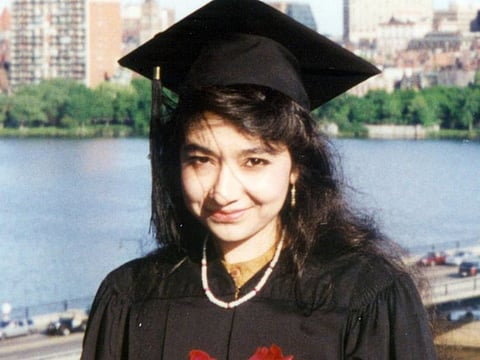Pakistan: Efforts underway to bring home Aafia after she met sister first time in 20 years
Pakistani neuroscientist is serving 86-year sentence in US prison

Islamabad: Pakistani neuroscientist Aafia Siddiqui, who is serving an 86-year sentence in a US prison, had an emotional reunion with her sister after almost 20 years of separation from the family.
The meeting took place this week at the FMC Carswell federal prison medical facility in Fort Worth, Texas, under strict surveillance and limitations. Aafia Siddiqui’s sister, Fowzia Siddiqui, was accompanied by Senator Mushtaq Ahmad Khan who played a role in arranging the meeting, and her lawyer Clive Stafford Smith, who facilitated the meeting.
During the reunion, Aafia Siddiqui reportedly shared the hardships she has faced in prison, including a deterioration in her health and hearing impairment from a head injury.
“Fowzia was obviously shocked by the state of her younger sister,” according to the statement by the Aafia Movement, which is leading the effort to get her home. Aafia spent the first hour detailing the daily trauma she experiences. After her lawyer encouraged her to talk about her loved ones, she said: “I miss my family every day, my mother, my father, you, my sister, and my children. I think of them all the time.”
The two sisters lost their mother in July 2022 but Aafia was not informed of the tragic news.
“It was deeply depressing, but nevertheless a privilege, to be present for this emotional reunion,” the lawyer said. “But the importance of these visits is, as Aafia makes very clear, how we can get her home from the hell of her current existence,” said Smith, a British human rights lawyer who is also working on behalf of those detained in Guantánamo Bay.
Pakistan Govt urged to speed up efforts
Senator Mushtaq Ahmad Khan emphasized the urgency of raising awareness about Aafia’s case and urged the Pakistani government to take up the issue of her release with the American government. “The meeting took place after 20 years and continued for two and a half hours,” he said in a Twitter post. “Dr. Fowzia was not allowed to hug or shake hands with Aafia. Dr. Fowzia was also not allowed to show Dr. Aafia pictures of her children.” The meeting took place in a room with a thick glass wall separating them.
Over the years, Fowzia Siddiqui’s tireless campaign for her sister’s freedom has gained global recognition and support from numerous human rights organizations and individuals.
Who is Aafia Siddiqui?
Dr Aafia Siddiqui, 51, is a Pakistani neuroscientist who was arrested in Ghazni province of Afghanistan on July 17, 2008, and was later convicted by a US court for attempting to kill US military personnel in Afghanistan and sentenced to 86 years in prison in 2010. The US also suspected her of having connections to Al Qaida.
Dr. Siddiqui has spent nearly 12 years in a federal prison in Texas, and her imprisonment remains a subject of controversy and advocacy by human rights organizations.
She has graduated from prestigious US institutions including the Massachusetts Institute of Technology (MIT) and later earned a PhD in neuroscience at Brandeis University. Her activism attracted the attention of American law enforcement in the years after the 9/11 attacks.
She returned to Pakistan with her family in 2002 and reportedly “disappeared” for five years (2003-2008) from a street in Karachi, Pakistan, with her three children, and there are allegations that she was held in secret US custody which the US authorities have denied.
In 2008, she was detained by authorities in Afghanistan. Her two oldest children, Ahmed and Maryam, were returned to the family in 2008 and 2010, respectively. They are both in their twenties now. The youngest child named Suleman is still missing and presumed dead.
Pakistanis see her as a victim of US injustices post-9/11. In November 2018, the Pakistani Senate passed a resolution proclaiming her a “Daughter of the Nation” whose case needed to be taken up with the US government urgently. Her lawyer Smith said that “our re¬¬quest is to let Aafia go home” but it could only hap¬¬pen if Pakistan made sincere efforts. Dawood Ghaznavi, a Pakistani lawyer involved in the free Aafia movement, stated that US authorities could transfer Aafia to Pakistan if the Pakistani authorities guarantee that she will be held in a secure location and prevented from resuming her activities.
Sign up for the Daily Briefing
Get the latest news and updates straight to your inbox



